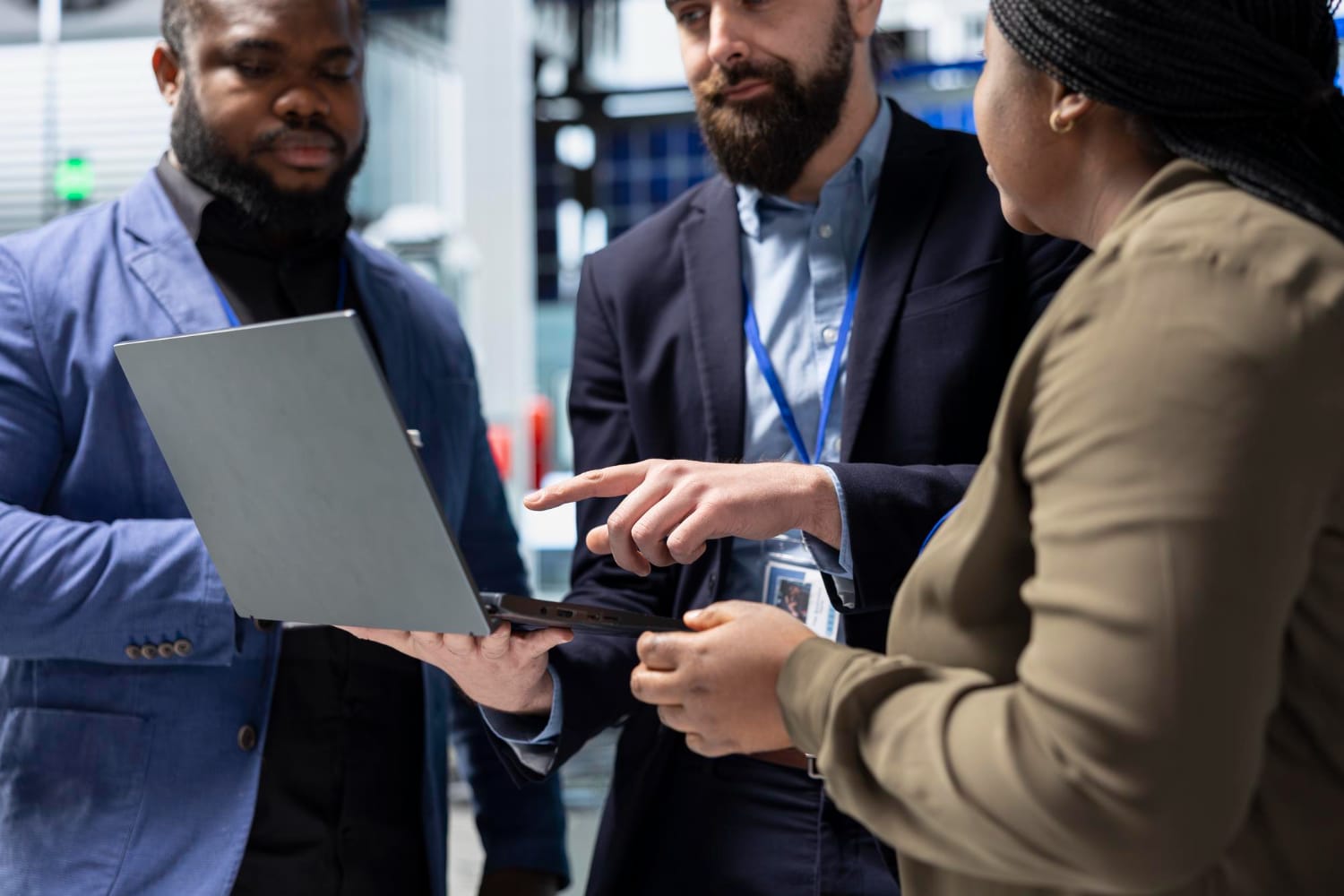Top Technology Trends of 2019

Summary: Learn about the latest technology trends of 2019. From self-driving cars to AI in every home and pocket, hear from Lonnie Cherry and Steve Ripper of Portsmouth Computer Group. Listen or read more to hear from PCG IT experts on the top technology trends of 2019.
Mike: Hey, it is Tech Tuesday everybody! The WTSN morning information center all brought to you by Portsmouth Computer Group, PCG IT. They have convenient locations in Portsmouth and Dover. Now brand-new locations in Manchester and up in Portland, Maine. World class IT service in customer support go to pcgit.com, that’s pcgit.com.
Lonnie and Steve are in studio today, all part of Tech Tuesday. Gentlemen, good morning to you.
Steve Ripper: Good morning, Mike!
Mike: Good to see you, good to see you.
Steve: Yeah.
Mike: Was it raining when you guys came in?
Steve: Oh, it’s terrible out there.
Mike: Isn’t this unbelievable?
Steve: It’s raw duck weather, you got to be a duck to like it.
Mike: I have never seen so many people complain, including myself about the weather today and all this week. We’re in the middle of May and today’s temperatures will be 20 degrees cooler than the normal high. The normal high is about 67, we’re not even going to hit 47 today.
Steve: Yeah, our co-worker Bill had tickets to the Red Sox on Sunday, he didn’t go. Mike, he didn’t go. He’s like, I’m good with that.
Mike: You know, the Red Sox should offer reimbursement.
Steve: They should. There’s rain hitting your face, it’s freezing out, there’s not enough hot chocolate in the whole building. There’s no way.
Mike: No, no, no. Hey, you guys are doing well? You doing well?
Steve: Yeah, yeah.
Top Technology Trends in 2019
Mike: All right, so you guys are always the leader of technology. Always seem to be one step ahead of everybody because this is your business, you guys are the expertise. We’re going to talk a little this morning for the next ten minutes or so about the top technology trends of 2019. Now, I love all the bells and whistles, and you guys kind of, sort of hear the rumors, and the rumblings through your trade as to what’s coming up. So, what are we talking about this week? As far as some things we’ll see this year?
Lonnie Cherry: Some hot topics for 2019.
Mike: Yeah.
Lonnie: What’s the . . .
Mike: . . . The things you need to know in 2019 that are coming out?
Steve: Mike do you have home automation?
Mike: Home automation?
Steve: Alexa. Do you talk to speakers? Do you walk around your house talking to the computer?
Mike: I do, but I have nothing that’s smartly hooked up to it. Like, I don’t have lights or heating or cooling systems that go on because I tell Alexa that I just . . . Alexa plays music for me and she’ll put a shopping list together but I have artificial intelligence.
Steve: Oh, yeah. So, that’s going to be big, it’s going to get bigger. You know, some things you’re going to see this year and next year are going to be like, we call it augmented reality. The internet of things. So, Alexa fits into the internet of things, and the reason why we call that that is, because, literally we’re putting the internet into devices. So, you can get alerts now, your refrigerator is getting too cold. Right, it’s set too high, things are freezing, or maybe the temperature’s too low. Maybe your dryer’s unbalanced, or it needs service, right?
Mike: Right.
Steve: So, the same way we’re starting to see cars for a long time have been doing alerts like whether they email you or they send it on the screen that’s on the —. You’re going to start seeing devices in your house. We’re starting to see that people listen to the radio they say that’s been coming out for a while but you’re really going to see a push now with the way they get us to adopt this is almost all the devices you would buy have it inside of it right? So, you’re going to go to the department store, you’re going to go Amazon, where ever you’re buying things and everything’s going to say hey, you know, connects to the smart home, connects to this, connects to the internet, has Wi-Fi enabled in it.
Mike: So, all the appliances that are coming out now will have all that stuff in it now?
Lonnie: Absolutely. Absolutely. Yep. You’re going to see more of that kind of trend. I think one of the other big trends you’re going to see this year is autonomous computing where forklift trucks and stuff like that are going to have built in computers. The drones that you hear about that Amazon are using, that’s going to be another hot trend this coming year.
Self-Driving Cars
Mike: Hey, some things that I don’t want to see like self-driving cars. I know, I know I’m one, I think we talked about this before. I’m not one for willing to get into a self-driving car, I just don’t see it. I don’t want to be a part of that, I don’t trust it I guess.
Steve: Yeah, no. So, it’s funny I think that the way the news keeps focusing on the autonomous car, the cars driving.
Mike: Yeah, yeah.
Steve: ‘Cause they’re working on that. But I don’t think that’s where you’re going to see it first, where you’ll see it first is more like trains. Trains who are like, or trolley’s that follow a set track through the town and maybe they’ll put something into the roads. But, they’re going to get to a point where something like a trolley doesn’t really need to have a human driving it, they’ll just drive it. You’re going to see a lot more factories type, and companies. You’re going to see forklifts that just drive around and grab the thing.
AI is Always Listening
Mike: I don’t know [crosstalk] I’m still not ready for that type of world yet I guess. I don’t know, I can deal with Siri, and Alexa, and stuff like that and just get information stuff but everything connected to those artificial intelligence devices, I don’t know yet, I think there’s too much room for error right now.
Steve: And the other thing, is, you’ll see a lot of people will get freaked out about having Alexa in the house, cause who’s listening, who’s monitoring Alexa, you talk . . . you know, so, people view a lot of this technology as ‘wow now they really know, everything about me.’ They know how cold my refrigerator is, they know how old my dryer is, they know the music I listen to just by tapping into Alexa. But, I mean, they know everything about us anyway at this point, that’s kind of my attitude, it doesn’t matter.
Mike: Do you guys actually believe that people are listening to what’s going on between Alexa and consumers? Do you believe that whole theory?
Lonnie: Not really, I mean, one of the other trends that’s coming up is cyber security, so I think with all this stuff that we’re talking about, you know, that cyber security trend is going to take care of the people listening on the other end, you know. They’re going to put more into these devices to make them a lot more secure, so those things don’t happen. Or your refrigerator doesn’t autonomously follow you around the house going ‘hey do you want something to eat?’
Mike: You know, I guess, you guys ever see the Steven King movie “Maximum Overdrive”?
Lonnie: Oh yeah.
Mike: Okay. So, there’s where the trucks and all the automobiles are going crazy and they’re evil.
Lonnie: Right.
Mike: They’re deadly.
Lonnie: Yeah.
Mike: That’s what I see. (laughing) That’s exactly what I see. A lot of you mention forklifts, I just see them killing people and just running over people.
Lonnie: So, the thing that, I don’t know if I worry about Mike, but like the person who is listening is Amazon right? So, every time you talk to Amazon, that’s who’s listening. So, you’ll see things like . . .
Mike: . . . Not national security . . . [crosstalk]
Lonnie: It wouldn’t be national security either. But you’ll see things like, what you’re going to see if you’re not seeing it already, is like, so if you tell Alexa to get you up or you start talking to Alexa in the middle of the night; you go on to Amazon and the first thing they’re going to start doing is they’re going to target, hey you need a new mattress. They’re not even going to tell you that the reason why they’re suggesting a new mattress is because they knew that you were up at 2 a.m. and you were just like ‘Alexa play sleeping music,’ right? So, they’re literally at the end the other end going he can’t sleep, do you need a new pillow? So, that’s the targeting advertising that’s going to happen or is happening already.
Mike: I know you guys are at the forefront of this technology, you guys are obviously, you welcome this type of stuff?
Lonnie: Absolutely.
Mike: You see any downside to it? I mean, besides cars and forklifts running crazy and wild killing people? (laughing)
Steve: Yeah, the part that you know, the robot part isn’t great. The part that I don’t like is . . . I think the part that everybody else doesn’t like is just how focused we are on it.
Mike: Yeah.
The Usefulness of Technology
Steve: That part I don’t like. I think the technology is useful, it makes us more productive, efficient, so if the forklift drives around and grabs things, you know people complain, they worry about losing their jobs but there also an opportunity to do a different thing than maybe just drive that all day.
Mike: Does it make us lazier though? I mean, I welcome all the bells and whistles of technology too, but I always see a bit of a downside to that technology sometimes. You mentioned losing jobs, losing humans for jobs, you know. I don’t know if I want to be on a bus that has no driver, I don’t know if I want be that way.
Lonnie: There are somethings out there right now that are doing these things, you know. There’s a train to JFK, and New York that is run pretty much from a control center. They’re things that are happening that you just don’t realize are happening. I think that’s how they ease us into it, then we fully accept it. I think if I had to pick one of that I don’t like is you know, it’s like email. When email came out everyone adopted it fully, and now people can’t live without it. It’s like the only mode of communication that matters to them anymore.
Mike: Or, they don’t like it as much because all they get is junk email and [crosstalk] it’s overload. So, people are creating one email address for their personal stuff, and one email address for their work stuff and one email address for their fun stuff. I mean, it’s just too much to have one email address nowadays.
Lonnie: Yeah, and you know so yeah I can see the negatives to it, Mike. But I also see some positives, so you know, if they start doing like large drones that can deliver your package. So now you’re going to see people who live in pretty remote areas who might not be able to get deliveries, they’ve gotten used to a lifestyle maybe, unhappily, it’s every three days or it takes a long time for the UPS guy to come of the Amazon, now all of a sudden the drone just drops it off. So, they can live further away, or live more rurally but still get the services that everybody else does. I don’t know, I tend to look at it more positively. You know, I don’t know if I like how I feel about it until I get on a train that isn’t being run by a person, maybe I’ll feel better that that person can’t go crazy and kill us all. Maybe the machine does? Maybe it’s the same thing?
Mike: What about a plane without a pilot?
Lonnie: Yeah, so, I think that’s a long, long time away.
Mike: I hope so. (laughing)
Lonnie: You know. It’s probably not as far away as the cars on the road without a driver.
Mike: I know, I know.
Lonnie: Cars on the road is far, far away. The pilots, the planes tend to land themselves already. They tend to just watch.
The Downside of Too Much Technology
Mike: Yeah, absolutely. But, here’s my theory on this, you know, unless there’s a 100% probability of your computer not crashing, which is unlikely, then if everything is run by a computer, then what happens when the self-driving cars, the computers crash? What happens when this train, self-driving train, the computer crashes? What happens back then? Because, that is to me, a very serious problem. And, I’m being very serious about this now because, you know, I know how upset we get when our computers crash, where you can’t log on or it’s not booting up fast enough, that’s a simple thing! Now, we’re talking about forklifts, buses and trains and self-autonomous cars. I mean, what happens when the computer system in that fails?
Lonnie: Well, the flight attendant would just run up to the front and reboot it, right? (laughing). Just reboot the plane. So, could someone reboot the plane?
Mike: I get it, so the flight attendant would probably just drop her drink down for a second, and then go back and [crosstalk] say anybody in the cockpit please?
Lonnie: Mike, it’s a robot going up and down the aisle with the drinks, she doesn’t have to bring drinks anymore, it’s a robot.
Mike: It just reminds me of that scene in Airplane. The copilot,[crosstalk] the inflated copilot. (laughing) I want one of those. (laughing) I’ll have one of those.
Defining Augmented Reality
Lonnie: And then the other big one’s going to be augmented reality. And that’s already here, we saw it a little with the Pokemon thing last year.
Mike: Now, what is that? What do you consider augmented reality?
Lonnie: So, augmented reality is, as opposed to virtual reality or VR; VR is where you’re literally putting goggles on, right? So, you’re putting down something over your face.
Mike: And you’re going into a different world.
Lonnie: And you’re going into a different world where, augmented reality is going to be — they’re going to use the camera on your phone. So, if you hold the phone up, you can walk around with the camera and the GPS and they, whatever, so you have down load an app or be a part of it but it will put things in the camera that you can see. So, if you don’t look at the phone, there’s nothing in front of you ‘cause this is reality.
Mike: Got it, got it.
Lonnie: But in the phone, you might see a giant green arrow that leads you to a sale. Right, it’s going to be advertising, right? That part, we’re going to see a lot more of it, I’m not excited for that just because so many people stare at their phones so much already.
Steve: And, we’re seeing a lot of that now. Wii-go cinemas is doing it with a video game where you can download the app and you can point your camera at their screen and you play a little mini 30 second video game, it’s kind of advertisement for them.
Lonnie: Interesting.
Steve: Yeah, yeah. The Pokemon go thing that people were doing, you know.
Lonnie: A couple of years ago, yeah.
Steve: That’s augmented reality, that’s really huge. And then some movies are doing it now, with beaming you; advertisement for their movie so you can see the set, and move your camera around their set, you know, while you’re sitting at your desk.[crosstalk]
Lonnie: And then that TV show, the TV show where you could pick the ending.
Steve: Oh, right, yeah.
Lonnie: So, you can think of that as augmented reality too, where’s it’s not just a TV show, but they’re giving you an option for which, choose your own ending basically.
Mike: So, what you guys are saying, we’re going to be living in one big video game.
Steve: Exactly.
Lonnie: That’s exactly right.
Steve: The Matrix.
Lonnie: The Matrix. (laughing)
Mike: That didn’t end very well.
Lonnie: No, it didn’t.
Mike: It did not end very well. (laughing) Thank you guys, very interesting topic. I love talking about this stuff. To put all of this aside, I do welcome a lot of this stuff, but I have reservations on some other things.
Lonnie: Sure.
Mike: You know, I think it’s the reason why people feel their safer in a car than in a plane because they have control.
Steve: Absolutely.
Lonnie: Yeah.
Mike: Even though the statistics say, no you’re not.
Steve: So, I don’t really like flying Mike, and that’s the reason why. It’s like I feel like something bad could happen and I have no control over it.
Mike: You have no control over it.
Steve: I’m in a tube going somewhere.
Lonnie: And you’re right, the car is less safe.
Steve: In a tube. (laughing)
Lonnie: The car is less but at least I’m the one making…
Mike: But you’re behind the wheel. You’re the one making the decisions.
Lonnie: If it happens to end deadly, I’m probably the one who made it happen.
Mike: Yeah, always good to talk to you guys. Steve and Lonnie join us this morning from Portsmouth Computer Group, PCG IT for world class IT service and customer support, just go to pcgit.com, give our regards to Dave as always, gentlemen.
Steve: Definitely.




